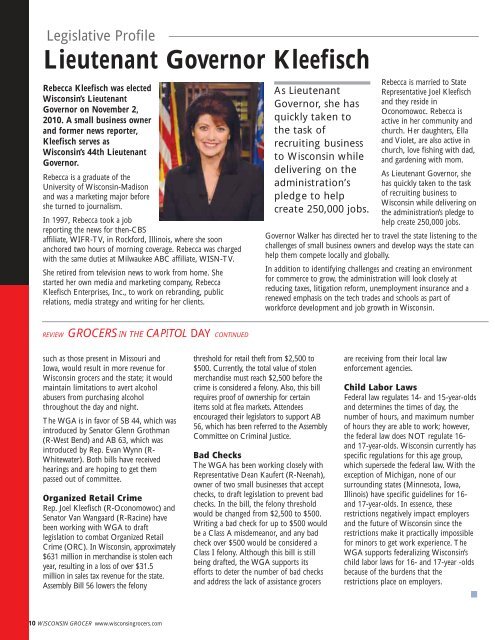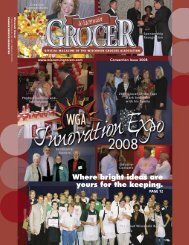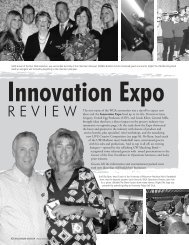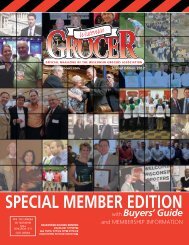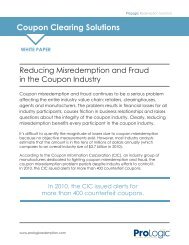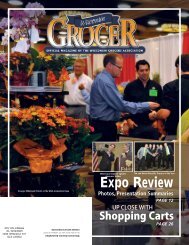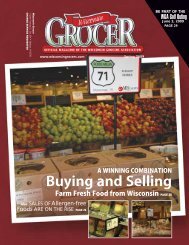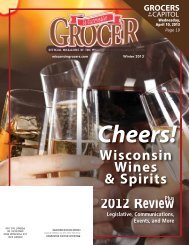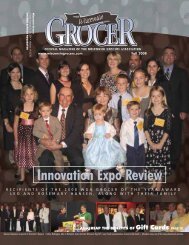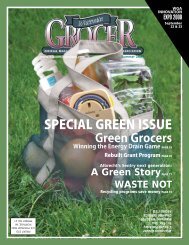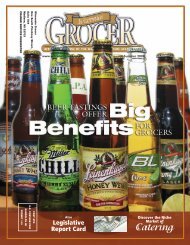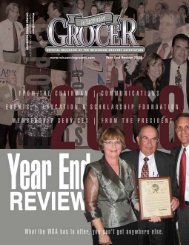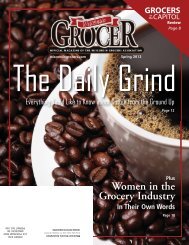Gluten-Free Stores - Wisconsin Grocers Association
Gluten-Free Stores - Wisconsin Grocers Association
Gluten-Free Stores - Wisconsin Grocers Association
You also want an ePaper? Increase the reach of your titles
YUMPU automatically turns print PDFs into web optimized ePapers that Google loves.
Legislative Profile<br />
Lieutenant Governor Kleefisch<br />
Rebecca Kleefisch was elected<br />
<strong>Wisconsin</strong>’s Lieutenant<br />
Governor on November 2,<br />
2010. A small business owner<br />
and former news reporter,<br />
Kleefisch serves as<br />
<strong>Wisconsin</strong>’s 44th Lieutenant<br />
Governor.<br />
Rebecca is a graduate of the<br />
University of <strong>Wisconsin</strong>-Madison<br />
and was a marketing major before<br />
she turned to journalism.<br />
In 1997, Rebecca took a job<br />
reporting the news for then-CBS<br />
affiliate, WIFR-TV, in Rockford, Illinois, where she soon<br />
anchored two hours of morning coverage. Rebecca was charged<br />
with the same duties at Milwaukee ABC affiliate, WISN-TV.<br />
She retired from television news to work from home. She<br />
started her own media and marketing company, Rebecca<br />
Kleefisch Enterprises, Inc., to work on rebranding, public<br />
relations, media strategy and writing for her clients.<br />
As Lieutenant<br />
Governor, she has<br />
quickly taken to<br />
the task of<br />
recruiting business<br />
to <strong>Wisconsin</strong> while<br />
delivering on the<br />
administration’s<br />
pledge to help<br />
create 250,000 jobs.<br />
Rebecca is married to State<br />
Representative Joel Kleefisch<br />
and they reside in<br />
Oconomowoc. Rebecca is<br />
active in her community and<br />
church. Her daughters, Ella<br />
and Violet, are also active in<br />
church, love fishing with dad,<br />
and gardening with mom.<br />
As Lieutenant Governor, she<br />
has quickly taken to the task<br />
of recruiting business to<br />
<strong>Wisconsin</strong> while delivering on<br />
the administration’s pledge to<br />
help create 250,000 jobs.<br />
Governor Walker has directed her to travel the state listening to the<br />
challenges of small business owners and develop ways the state can<br />
help them compete locally and globally.<br />
In addition to identifying challenges and creating an environment<br />
for commerce to grow, the administration will look closely at<br />
reducing taxes, litigation reform, unemployment insurance and a<br />
renewed emphasis on the tech trades and schools as part of<br />
workforce development and job growth in <strong>Wisconsin</strong>.<br />
REVIEW GROCERS IN THE CAPITOL DAY CONTINUED<br />
such as those present in Missouri and<br />
Iowa, would result in more revenue for<br />
<strong>Wisconsin</strong> grocers and the state; it would<br />
maintain limitations to avert alcohol<br />
abusers from purchasing alcohol<br />
throughout the day and night.<br />
The WGA is in favor of SB 44, which was<br />
introduced by Senator Glenn Grothman<br />
(R-West Bend) and AB 63, which was<br />
introduced by Rep. Evan Wynn (R-<br />
Whitewater). Both bills have received<br />
hearings and are hoping to get them<br />
passed out of committee.<br />
Organized Retail Crime<br />
Rep. Joel Kleefisch (R-Oconomowoc) and<br />
Senator Van Wangaard (R-Racine) have<br />
been working with WGA to draft<br />
legislation to combat Organized Retail<br />
Crime (ORC). In <strong>Wisconsin</strong>, approximately<br />
$631 million in merchandise is stolen each<br />
year, resulting in a loss of over $31.5<br />
million in sales tax revenue for the state.<br />
Assembly Bill 56 lowers the felony<br />
threshold for retail theft from $2,500 to<br />
$500. Currently, the total value of stolen<br />
merchandise must reach $2,500 before the<br />
crime is considered a felony. Also, this bill<br />
requires proof of ownership for certain<br />
items sold at flea markets. Attendees<br />
encouraged their legislators to support AB<br />
56, which has been referred to the Assembly<br />
Committee on Criminal Justice.<br />
Bad Checks<br />
The WGA has been working closely with<br />
Representative Dean Kaufert (R-Neenah),<br />
owner of two small businesses that accept<br />
checks, to draft legislation to prevent bad<br />
checks. In the bill, the felony threshold<br />
would be changed from $2,500 to $500.<br />
Writing a bad check for up to $500 would<br />
be a Class A misdemeanor, and any bad<br />
check over $500 would be considered a<br />
Class I felony. Although this bill is still<br />
being drafted, the WGA supports its<br />
efforts to deter the number of bad checks<br />
and address the lack of assistance grocers<br />
are receiving from their local law<br />
enforcement agencies.<br />
Child Labor Laws<br />
Federal law regulates 14- and 15-year-olds<br />
and determines the times of day, the<br />
number of hours, and maximum number<br />
of hours they are able to work; however,<br />
the federal law does NOT regulate 16-<br />
and 17-year-olds. <strong>Wisconsin</strong> currently has<br />
specific regulations for this age group,<br />
which supersede the federal law. With the<br />
exception of Michigan, none of our<br />
surrounding states (Minnesota, Iowa,<br />
Illinois) have specific guidelines for 16-<br />
and 17-year-olds. In essence, these<br />
restrictions negatively impact employers<br />
and the future of <strong>Wisconsin</strong> since the<br />
restrictions make it practically impossible<br />
for minors to get work experience. The<br />
WGA supports federalizing <strong>Wisconsin</strong>’s<br />
child labor laws for 16- and 17-year -olds<br />
because of the burdens that the<br />
restrictions place on employers.<br />
10 WISCONSIN GROCER www.wisconsingrocers.com


